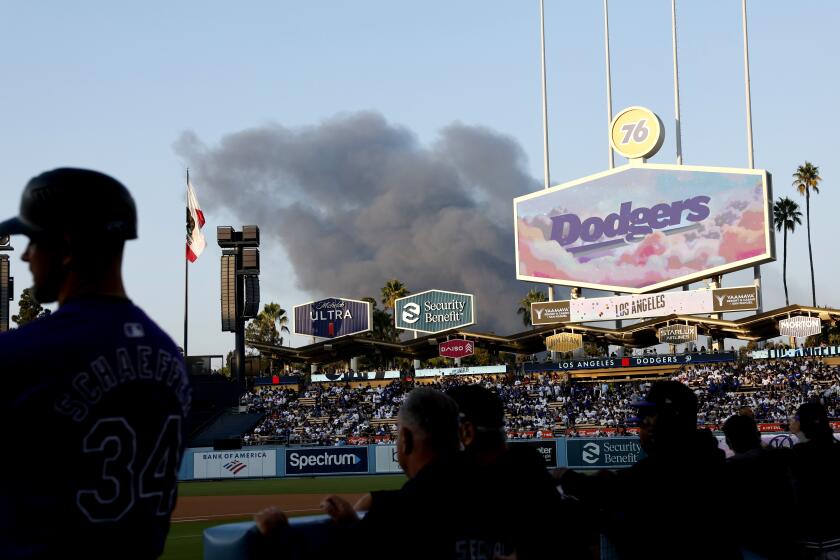Long Beach energy project halted
After four years of scrutiny, Long Beach officials Monday pulled the plug on a controversial energy project that promised an abundant new source of clean-burning liquefied natural gas for California but posed insurmountable safety concerns.
In a unanimous vote, the Long Beach Board of Harbor Commissioners decided to end an environmental review of the project that was launched more than two years ago but had slipped far behind schedule. The action effectively terminates the effort by the port and a partnership of Mitsubishi Corp. and ConocoPhillips to build a $700-million liquefied natural gas plant inside the busiest cargo port in the nation.
“The project is dead,” said Doris Topsy-Elvord, a commissioner and former Long Beach councilwoman. “It’s been a long haul, we’ve worked hard at it, but it is at a standstill. I do not think there’s a possibility it will come back,” she said.
The project has roiled the community while underscoring the challenges in providing fuel for rapidly growing California.
Liquefied natural gas terminals have been favored by the Bush administration and Gov. Arnold Schwarzenegger as a way to bring fuel from overseas as North American sources diminish. Air quality officials and some environmentalists also favor LNG because it generally burns cleaner than other fuels, helping to alleviate smog.
But others expressed misgivings about the Long Beach project, called Sound Energy Solutions, including Sen. Dianne Feinstein (D-Calif.), the state Public Utilities Commission, the California Energy Commission, the California Coastal Commission, members of the Long Beach City Council and neighborhood groups.
“This is very good news for the people of Long Beach,” said Bry Myown of Long Beach Citizens for Utility Reform. “This was just a bad project.”
Specifically, opponents raised safety concerns, citing the potential for a catastrophic natural gas explosion that could kill hundreds of people and devastate much of the Long Beach waterfront.
“This project would have put over 140,000 people who live and work within 3 miles of that LNG terminal at risk,” said Harvey Morris, an attorney for the Public Utilities Commission. “The evidence was overwhelming there’s all kinds of things that could go wrong if there was a terror attack or earthquake. There’s a need for LNG, but there are much safer alternatives.”
David Giles, an executive with Mitsubishi-ConocoPhillips, expressed disappointment with the decision by the Harbor Commission. He said the partnership would study the decision and would be reviewing options. Mitsubishi-ConocoPhillips has in the past threatened to sue the harbor if it halted the project.
“We’re very surprised,” Giles said. “We’re surprised because we had restarted negotiations with the city on financial matters last week. We assumed things were going through a normal environmental review process.”
Since Long Beach officials began reviewing the project, other energy companies have proposed liquid natural gas terminals offshore in Southern California where the risk to the public is minimal.
Australia-based BHP Billiton proposes a floating terminal off the coast of Ventura County; Crystal Energy Co. wants to convert an old oil platform to an LNG terminal offshore from Oxnard; and Woodside Energy Ltd. wants to build one near Malibu; Sempra Energy Co. has already begun building a massive LNG terminal near Ensenada in Baja California, Mexico.
Signs that the Long Beach project was headed for trouble emerged more than a year ago when state agencies clashed with the Federal Energy Regulatory Commission over permits and safety issues.
Last summer, the Port of Long Beach opted not to extend a contract that gave Sound Energy Solutions exclusive rights to build the terminal on 25 acres in the harbor.
In December, Harbor Commission President James C. Hankla told the Long Beach City Council that he intended to halt all work on the final environmental impact report unless the council indicated a clear willingness to proceed with the project. But the council, reconstituted in the November election, has been cool to the LNG proposal.
On Jan. 8, Long Beach City Atty. Robert E. Shannon wrote a memo to the Board of Harbor Commissioners urging it to halt all work on the project. In the memo, he said that because of flaws identified in the draft environmental study, “we have no confidence that these flaws will ever be adequately remedied.”
Specifically, Shannon said that neither Sound Energy Solutions nor the federal energy commission had adequately addressed safety issues raised by critics. He charged that the federal commission, citing security and energy imperatives, refused to make public crucial information about the design and safety of the project.
Acting on that legal advice, the five-member Board of Harbor Commissioners for Long Beach unanimously voted to halt work on the LNG project and issued a statement that says, “Since an agreement between Sound Energy Solutions and the city does not appear to be forthcoming, the Board of Harbor Commissioners disapproves the project and declines to pursue further negotiations.”
More to Read
Sign up for Essential California
The most important California stories and recommendations in your inbox every morning.
You may occasionally receive promotional content from the Los Angeles Times.










